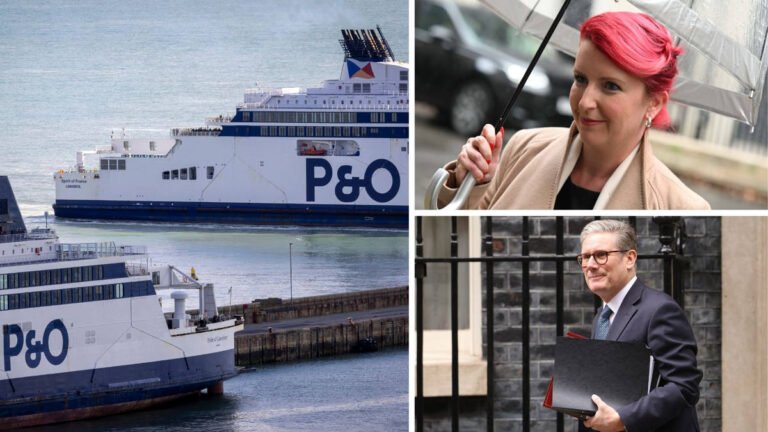11 October 2024, 20:07
Picture:
Getty
DP World has withdrawn from a major investment summit following remarks by the Transport Secretary, Louise Haigh, in which she referred to its subsidiary, P&O Ferries, as a “cowboy operator.”
Haigh’s comments were made during an interview where she criticised P&O Ferries for its controversial treatment of workers in 2022, when the company fired 800 British employees and replaced them with cheaper overseas staff.
DP World, which had planned to announce a £1 billion investment in its London Gateway container port at the summit, has now cancelled its participation, creating a significant setback for the event.
The planned announcement was expected to focus on the expansion of the London Gateway container port.
Picture:
Getty
The timing is awkward for the Labour government, as the summit was intended to highlight the UK as an attractive destination for foreign investment.
In an effort to contain the fallout, Downing Street distanced itself from Haigh’s comments, with a source clarifying that her views did not represent the government’s official position.
This incident underscores the tensions between political criticism and business interests, especially in cases like P&O Ferries, which have faced public outrage over controversial business practices.
DP World’s withdrawal is seen as a significant setback to Labour’s efforts to promote the UK as a hub for foreign investment.
Picture:
Alamy
Speaking alongside Deputy Prime Minister Angela Rayner on Wednesday, Haigh announced new measures aimed at protecting seafarers from exploitative practices, specifically targeting companies like P&O Ferries.
During the interview with ITV News, she referred to P&O Ferries as a “rogue operator,” pointing to the company’s 2022 scandal where 800 British workers were abruptly fired and replaced with cheaper overseas agency workers.
Haigh explained that tough legislation is being introduced in parliament to prevent similar incidents in the future.
“We’re cracking down on the way they treated employees, and we want them to meet the standards of other operators in British waters,” she said.
Read more: More than 50 UK-linked firms investigated for suspected breaches of Russian oil sanctions
Highlighting the broader aim of the legislation, Haigh added: “Make no mistake, this is good for workers and good for business.
“Cowboy operators like P&O Ferries will no longer be able to act with impunity, undercutting responsible employers in the process.”
While Haigh’s comments were likely approved by No 10, they had unintended consequences, derailing the upcoming investment summit.
Picture:
Getty
The summit was designed as a key event for the Labour government, aimed at showcasing the UK’s openness to foreign business and breaking away from the negative rhetoric that has dominated the early days of Starmer’s administration.
The announcement of a £1 billion investment in the expansion of the London Gateway port, led by DP World, was expected to be a centerpiece of the summit.
However, in response to Haigh’s remarks, DP World, which owns P&O Ferries, abruptly cancelled its plans to participate in the event.
The Dubai-based logistics giant, which had been expected to send three senior executives to the summit, will now no longer attend.
This sudden withdrawal is seen as a significant blow to the government’s efforts to project confidence and stability to international investors.
Picture:
Getty
‘Not a good look’
A senior source commented on the fallout, saying: “You can either see this as a major own goal by the government or the Emiratis being heavy-handed.
“Of course, there’s an element of both, but it’s not a good look for the government.”
The timing of DP World’s pullout complicates Labour’s narrative, as the summit was intended to demonstrate that the UK remains an attractive destination for foreign investment and to counter the early criticism surrounding Starmer’s first 100 days in office.
The situation highlights the delicate balancing act between promoting responsible business practices and maintaining strong relationships with international investors.
While Haigh’s comments were aimed at holding companies accountable for exploitative labor practices, they have inadvertently strained relations with one of the UK’s key foreign investors at a time when the Labour government is eager to project economic stability and growth.







